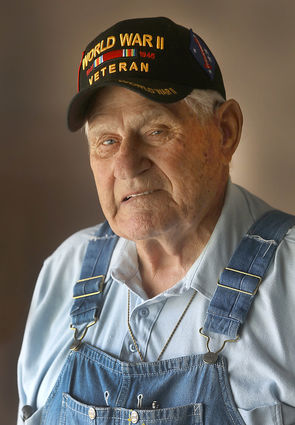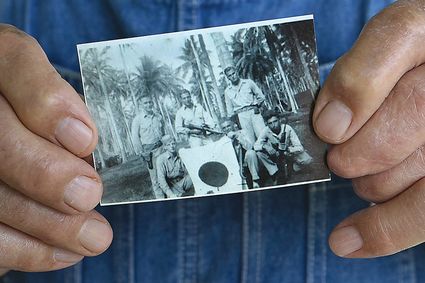REMEMBERING
Memorial Day is personal for veteran
May 27, 2021

Ed Moreth
OKINAWA VETERAN – Former Marine Corps machine gunner Tom Charlton of Plains deals with memories of his battle days on the island of Okinawa in World War II.
Tom Charlton doesn't plan a big birthday bash when he turns 95 next week, but at least it'll be more than when he turned 19 when he was fighting for his life.
On June 8, 1945, Charlton was a Marine Corps machine gunner on the island of Okinawa and an estimated 130,000 Japanese soldiers were dug in for a last ditch effort to keep the allies from their next objective - Japan. Days passed before Charlton, a private first class, even realized his birthday had gone by. The Battle of Okinawa was the largest battle of the Pacific Theater and was waging all around him and the others of the 1st Marine Division.
Charlton spent the entire conflict from April 1 to June 21 as one of two machine gunners in his squad. During that time, he saw some horrible sights and lost friends and fellow Marines, which is why Memorial Day takes on a more personal meaning for him. "I think of some of my buddies that were killed over there," said the Plains resident. Charlton was born in Raymond, Washington, but his family moved to Paradise after he was about one month old. His son, Thomas Charlton, Jr., lives in Plains, along with his daughter, Sally Miller. His other children, Debby Hoffard and Jenny VanCampen, live in Napa, Idaho.
Charlton used to have bad dreams about his time on Okinawa. "I'd wake up and I'd lay there the rest of the night thinking about this stuff, but I haven't had any in a long time," something he credits to a Veterans Administration counselor in Missoula, who suggested that he record his battle experiences on a CD. "It seemed like it lifted a big burden off my chest," said Charlton, who added that he had been married to Ruth over 60 years before she ever heard of his involvement on Okinawa. Ruth's older brother, Sydney, was killed at Normandy in World War II and her youngest brother, Bobby, was killed in the Vietnam War.
The Battle of Okinawa was the last battle of the war and included four Army divisions and two Marine divisions, including Charlton's Baker Company, 1st Battalion of the 1st Marine Division. There were some 278,000 American troops involved in the battle and by the time it was over, 12,500 had perished. With the victory at Okinawa, the Allies were prepared for an attack on mainland Japan, nearly 400 miles away.
Charlton's company arrived at Okinawa about a half mile offshore on a Navy troopship a day or two before the start of the battle. He said they wanted to get the Marines to the beach quickly before Japanese kamikazes could attack the ships. Charlton and the other Marines transferred to an amphibious landing craft for the final leg to shore. The former Private 1st Class Charlton said they landed on the beach unopposed, but as they moved inland, they started taking sniper fire. "I think they were about three miles in and that's where they were laying there waiting for us," said Charlton. "It was usually toward the end of the day. They were really dug in, shooting at us from caves."
Charlton was one of two 30-caliber machine gunners in a rifle platoon. The 30-calibers were usually placed on the platoon's two flanks. He said the enemy specifically targeted machine gunners, along with mortar teams and radio men. Charlton said the caves the enemy used had intricate passages and many exits. He said their artillery constantly zeroed in on the caves, to no avail. "You think you had them wiped out, but then they'd be shooting at us from the same place as before," he said. "It seemed there wasn't a day gone by that there wasn't somebody shooting at us. There was never a quiet day there. I can't remember a peaceful day; our adrenaline was constantly up."
He said his Marine unit was moving across the island in conjunction with an Army company, but one time his unit got word to move out and the Army didn't. At that point, the enemy got between the Army and surrounded the Marines for three or four days in the vicinity of what was known as Shuri Castle. "At night and day both, we had to be on our toes and they liked to have those banzai attacks at night," said Charlton, who added that they were wet and cold and supplies had to be dropped in until they could break free. When they were surrounded was one of the times that he fired his machine gun at night during a banzai attack. "I only shot it a couple times at night. It was pretty dangerous for us to fire at night because every fifth round is a tracer bullet and then they knew right where we were," he said.
Charlton said he sometimes gets the timelines of his experiences on Okinawa mixed up, while others are as vivid as if they just happened. He said their trek across the island seemed endless with one ridge after another and one hill after another, and all the while being shot at. And there continues to be episodes on Okinawa that continue to bother him, such as when a Japanese soldier approached his platoon with a small civilian girl in his arms. As they drew closer, he heard a click - the girl had pulled a grenade pin and killed them both.
He recalled on one occasion when they were preparing to move to the rear area and he sent a Marine named Rickter up a hill to show a lieutenant where they had set up their machine gun. As the two reached the spot, Charlton saw a mortar round hit, killing his friend. "I felt bad because I was the one that sent him up there."
On one evening, as they were settling in for the night, a squad leader he knew only as "Red" told them that they were going out on a forward patrol and would return by morning. "They all filed out on their patrol. We never saw them again; they never came back," said Charlton, who added that two days later they found the mutilated bodies of all six men on a knoll. "What I remember most was that squad leader - Red - they just cut his head off. I'll never forget that," said Charlton. "That's one of the memories; I can still see it. It's probably the most horrible scene I had seen over there."
"I hate to tell this, but one day we were walking along and saw this Japanese soldier just sitting there sitting against a bank and he was alive. I could see one hand, but not the other. He had dark brown eyes and they were kinda glistening, like they were tears. I took that carbine I picked up and shot him. I never gave it a second thought back then, but I've always thought about this, that he had a family back home. Sometimes you were hardly human out there," said Charlton. "We didn't know if he had a grenade in his other hand or if he was booby trapped. They did that kind of thing."

Ed Moreth
COMRADES – Former Marine Corps machine gunner Tom Charlton holds a photograph taken at Okinawa in 1945 with some of his fellow Marines. He doesn't remember all their names. From left front row: Pvt. Grimlick, Pfc. Grimes, Rickter. Top from left: Pvt. Rarden, Corp. Gelhar, and Tom Charlton.
The incident was something that didn't bother him until he got older. "It was a different world back then. It was the heat of battle. We didn't take prisoners and neither did they." Later, the same carbine he used on the Japanese soldier saved him from serious injury. He was sitting down eating k-rations with the rifle across his legs when a mortar round hit nearby. Shrapnel cut the gun down the middle lengthwise. "I wonder what would have happened if I didn't have that on my lap. I guess someone of a higher authority was watching over me and I didn't deserve it," said Charlton. He was still on Okinawa when they received word that the war was over and Japan surrendered. He remembered how happy they all were when they were told. Charlton and his squad were then deployed to China, where they rounded up Japanese soldiers and loaded them into vessels for their return to Japan.
Upon his return to the states and civilian life, he went right to work, taking on different occupations over the years before retiring in 1987 and returning to Plains. Even after retirement, he liked to stay busy, volunteering to do handyman work for local residents. "A lot of guys came home and started drinking; I came home and worked. I was a work-a-holic," he said. He said they hated the Japanese back then and the Japanese hated Americans, but as the years passed so did the ill feelings toward the former enemy. He even visited Japan in the 1970s. His son, Thomas, Jr., and grandson, Brandon Miller, both joined the Marine Corps and both had even been stationed in Okinawa.
Charlton likes to keep active and takes a mile walk with his dog "Shaggy," everyday. He plans t carry the Marine Corps flag with VFW Post 3596 color guard on Plains Day. "A lot of the old guys are going to ride in the wagon," said Charlton, "but I'm going to walk."








Reader Comments(0)